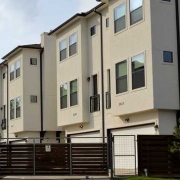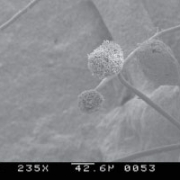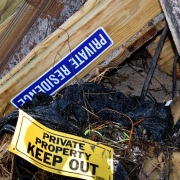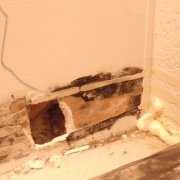Sick-Building Complaints On Rise
Cities attempt to get air quality under control in their offices.
Shortly after former Sebastian police Chief Dennis “Randy” White moved into his office at the city’s Police Department in 1996, he developed a constant nasal drip in the back of his throat and a dry cough.
His doctor diagnosed allergies but then he started to hear co-workers’ complaints of similar symptoms, conditions they said seemed to improve when they were out of the building during weekends or vacations.
Then White watched a 10-inch plant grow out of a wall in the department and wind around the window. Afterwards, he discovered dark mold behind a picture on his office wall. “The building wasn’t right,” he said, adding that mold and mildew problems persisted in the building despite city officials’ efforts to fix it.
White and eight others at the department filed worker’s compensation claims, arguing the building made them sick, and recently received out-of-court settlements.
The Sebastian police station isn’t the only municipal building that has been touched with mold problems or poor air circulation. An increasing number of government buildings in Central Florida are facing complaints of “sick building syndrome,” a general classification for worker ailments from dizziness and headaches to upper respiratory ailments.
A report last year found six federal courthouses in Central Florida, including Orlando and Ocala, were contaminated with mold and other fungi, leaving workers with high rates of illnesses and breathing problems.
The complaints can lead to costly lawsuits and worker’s compensation claims, which some local governments are trying to head off by fixing problems now.
Rockledge, for instance, closed one of its fire stations for weeks last December to rid it of mold and beef up air quality after several firemen got sick.
Other local and state governments throughout the United States have taken measures to keep the air quality in offices high while reducing the occurrences of mold and mildew. But the preventative and corrective measures aren’t cheap.
Some municipalities have had to shell out big bucks to ensure their buildings are up to standard. Others have still had to pay the medical bills for workers who have exhibited ongoing symptoms.
Cost of Good Air
In 1984, the World Health Organization Committee said up to 30 percent of new and remodeled buildings worldwide have complaints related to indoor air quality. Florida is no exception.
In the subtropics of the state’s coastal areas, cooling and removing the humidity from the air inside buildings and preventing mold buildup is a year-round battle that has come with a big price tag.
For instance, Sebastian officials spent more than $250,000 to remove carpets, replace walls and rework air-circulating equipment at their Police Department headquarters. The city of Rockledge paid $88,000 last year to replenish the air quality in its fire station.
Between 1997 and 2001, the Brevard County School District spent more than $19 million to revamp, clean and replace air-conditioning systems in its offices and area schools. That doesn’t include projects involving roofs, doors or windows that impact indoor quality, nor the ongoing maintenance of air conditioning equipment.
“There are a large number of buildings that date back to the mid-1960s. It’s a challenge to take 1960s technology with air conditioning and yet continue to provide good air quality,” said Richard Smith, indoor air quality control coordinator for the district.
He said air-conditioning systems represent the largest unfunded need in ongoing school maintenance programs. “It’s always the largest chunk of our 5- or 10-year plans,” he said.
Greg Smith, assistant superintendent of operations for Indian River County schools, said the district is spending about $1 million to revamp the air-conditioning system at Thompson Elementary School in Vero Beach.
Last year, the district did similar work at Highlands Elementary and Sebastian River Middle School.
Also, the Indian River County Commission recently decided to build a new municipal building, in part because of the poor air conditioning and circulation system.
“We want to address air quality concerns in the development of plans for a new building. That’s also why the Space Needs Committee has recommended an open-office design to prevent stagnant areas,” said Tom Frame, county general services supervisor.
Sealed Systems
In order to understand why the problems are so prevalent now, officials had to look no further than when government buildings were constructed. Many are decades old and were built in a time when air quality issues weren’t a major consideration.
During the 1970s, when the cost of heating fuels skyrocketed, builders favored a cheaper system that re-circulated air instead of bringing in fresh air that had to be cooled and humidity-controlled.
Also during the same time, the term “sick building” developed after several people in a single building reported similar medical difficulties. Then in 1976, Legionnaire’s Disease was first cited at a convention for veterans in Philadelphia.
The Legionella Pneumophila spore breathed by conventioneers through the center’s air circulation system infected 221 and killed 34. That incident raised public awareness about the dangers of unclean systems and poor air circulation.
No local buildings have been officially declared sick buildings, but many have had their air-conditioning systems replaced or repaired after complaints.
The sick building term is controversial and agencies and groups disagree about what constitutes a sick building. Some say a building is sick only when at least 20 percent of its workers have medical complaints.
“It’s often difficult to link the mold to the symptom. But we know that mold has the potential to cause respiratory ailments,” said Fred Blosser, public affairs officer with the National Institute of Occupational Safety and Health.
His agency avoids the term “sick building.”
“We prefer ‘indoor environmental quality’ to describe those problems,” he said.
He said when mold is found in a building, there generally are multiple causes, such as water seepage or air stagnation.
Blosser said there are no statistics on the number of buildings with air quality concerns. But complaints specifically citing mold doubled to nearly one in five complaints in 2001 compared with 1998.
Kevin Yarbrough, spokesman for the Federal Occupational Safety and Health Administration, said the agency doesn’t cover Florida government workers or have specific mold standards. He said technology can’t determine the exact amount of specific mold spores needed to affect people.
“When we get complaints about mold in buildings, we look for toxicity,” he said. He said that regular air quality maintenance, including frequent filter replacements, helps prevent mold buildup.
Shared Symptoms
Bob Migliara has worked as a Brevard County correctional officer at the county jail for nearly 15 years. In that time, he has developed constant sinus problems “and the coughing and hacking that goes with that.”
On Thursday, he finished a 10-day antibiotic cycle for recurring sinus infections.
When he’s away from work for vacation, his symptoms improve somewhat. “There’s no movement of air in the jail,” he said.
He and 65 co-workers filed similar worker’s compensation claims. “There was a big problem with sewage that came up into the kitchen, but that’s been corrected,” Migliara said.
Jacqueline Heller of Palm Bay resigned her post in the personnel office of the city of Melbourne after concerns the molds in her satellite office kept her on constant antibiotics. “Since I left, the difference is like night and day,” she said.
She said her co-workers also complained about sinus and allergy problems and mid-week fatigue. During her two-year employment, she said, “I had chronic sinusitis. Two weeks after I got off medicine, I’d be back on antibiotics again. I had bronchitis and pharyngitis all the time,” she said. Her physician suggested sick-building syndrome.
In May 2000, she and a colleague heard workers on the floor below and went to investigate. “They were removing walls and when I saw the mold behind the paneling, I said ‘this is what’s making us sick.’ ” By December, Heller resigned.
She said the satellite building was constructed as a telephone handling relay station and was not designed to hold workers.
She doubts city officials take her claims seriously. “To date, it’s like we’re making this up.”
Mounting Bills
Orlando Attorney Mick O’Brien, who represents White, Miliara, Heller and about 1,000 other clients in sick-building claims involving two dozen buildings around the state, said his clients aren’t looking for million-dollar settlements. They “want to get the building better for others” and have their medical bills paid.
Lost work time for employees in those areas are costly to municipalities, he said.
But O’Brien said many employees are afraid to file compensation claims for fear of retaliation and loss of job. “People say, ‘Why don’t they leave?’ but if you have a family to support, that’s not easy,” he said.
O’Brien said all but eight of his jail clients were seen by an occupational medical specialist. He said those claims are in the discovery phase where both sides seek documents before trial.
He said of the city of Melbourne’s 28 claims, six have gone to pretrial. He expects the first trial this fall.

 Image by
Image by  Image by
Image by 
 pixabay.com
pixabay.com  © American Federation of Government Employees Local 1237
© American Federation of Government Employees Local 1237 



